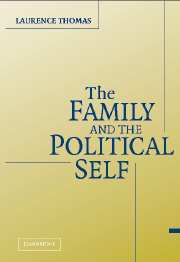Chapter 1 - Uniquely Valued
Published online by Cambridge University Press: 05 June 2012
Summary
A child who was treated morally, but who went unloved, is a child who would not, and could not, come to value itself properly. Nothing more fully bestows a sense of worth upon a newborn child than parental love. As infants, we are born into this world without a sense of self and so without a sense of value. And it is parental love, and nothing else, that at the outset makes it possible for us to have a proper sense of self. Anything else will invariably miss the mark. It is by virtue of being the unmistakable object of manifest parental love that we come to have a positive sense of worth, that we come to value ourselves as human beings. Indeed, in the absence of parental love, no sense of worth could easily obtain a purchase upon our lives, including moral worth. Thus, while there is no denying that morality is an intrinsic good, it is not first among intrinsic goods. Parental love is. From the standpoint of the development of our soul, parental love is more basic than morality.
CHERISHED UNIQUENESS
What explains this difference between parental love and morality? The answer is poignant by virtue of its simplicity. Of course, a moral person is one who treats others in the right way. All the same, a moral person may be indifferent to whether or not, in the first place, others come into being. There is no antecedent desire or longing for their existence.
- Type
- Chapter
- Information
- The Family and the Political Self , pp. 19 - 48Publisher: Cambridge University PressPrint publication year: 2006

